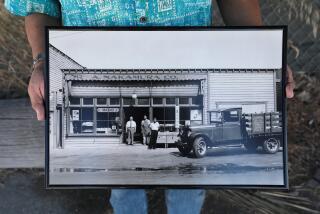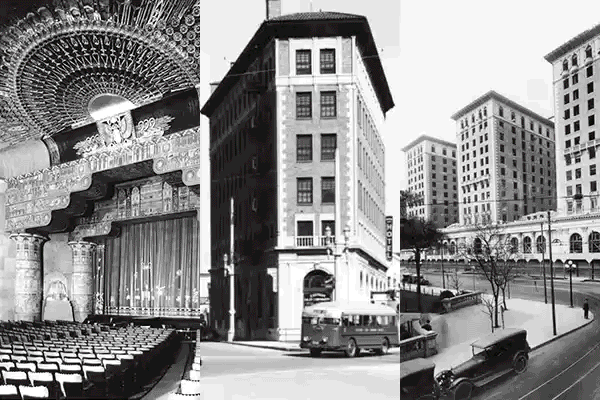‘This Is a House of Memories’
It was a street of homes back then, before the freeway and before tall buildings spiked the hazy downtown sky.
Mary Comaduran was 2 when they moved into the neighborhood in the mid-1950s and recalls kids riding bikes up and down the avenue.
Her father, a waiter, was able to walk to work at the Hilton just a few blocks away, and her mother tended the family of three girls with loving care.
That’s all gone now, encapsulated into photographs atop a dresser and on the walls of the house they lived in. Both parents are dead, Mary lives there alone and the place they called home stands in the way of tomorrow.
Things changed. As the years passed, what had been a neighborhood deteriorated slowly into a hangout for dealers and hookers and now is mostly an expanse of dirt cleared for development.
Only two pieces of property stand in the way of turning 2.6 million square feet of land south of downtown into a development called Metropolis with a hotel, stores and office buildings.
One piece is owned by Kaiser Permanente, the other by the Comaduran sisters, Mary, Emily and Rosemarie, and they’re hanging on by their teeth.
The scenario is a familiar one. When expansion is in the wind, people better get the hell out of the way.
*
The house, on West 8th Place just below the Harbor Freeway, was built in 1903. It’s a two-story Edwardian that the Comadurans paid $12,000 cash for when they moved up from Mexico in 1957. A jacaranda tree that stands taller than the building was planted by the mother a year after they moved in.
Mary is 43 and unmarried. The other two sisters, one married and one single, live elsewhere in Southern California, but all three are united in their opposition to City Centre Development, a Swiss company that wants to tear down the family home and add new towers to the L.A. skyline.
Their mother was still alive in 1983 when negotiations with City Centre began, and she was adamantly opposed to selling. When she died 12 years later, Mary says, her last words were, “Don’t let them cheat you.”
The death-bed advice has become a kind of mantra to the sisters, especially to Mary, who considered her mother “my best friend” and keeps her ashes on a shelf in the parlor.
“This is a house of memories,” Mary said to me one day, “and as long as I’m here, I feel close to my parents. It’s an emotional thing, I know, but that’s not bad, is it?”
That depends. At one point, City Centre was offering $1 million for the house. Now the Community Redevelopment Agency is saying accept $200,000 from the developers or the CRA will acquire the place through eminent domain. The offer is considered final.
The sisters are hiring a lawyer. “If they try to condemn this house,” Mary vows, “I’ll fight them with every penny I have. They may think we’re a bunch of dumb Mexicans, but we’re not.”
*
City Centre Vice President John Vallance says the company would rather settle with the Comadurans than utilize eminent domain, but adds that every offer his company has made has been turned down by the sisters, “sometimes hostilely.”
The $1-million proposal was made, Vallance says, “when times were better.” Mary now wishes they’d taken it: “Mother had just died and I didn’t want to leave. It was my fault, but I’m still not going to allow them to cheat us. It’s our inheritance.”
Vallance now offers what amounts to a shrug. One senses that a bottom line has been drawn at $200,000. Maybe a buck or two more, but that’s about it. If the Comadurans go to war, they will surely lose.
I can understand Mary’s emotional attachment to the house that now sits almost isolated in the shadows of the towers that loom on the skyline, dwarfed by the L.A. we are fast becoming.
I saw my boyhood home in East Oakland bulldozed into kindling to make way for a factory. With it went the ghosts of my childhood, the shouts and tears of a kid growing up, shattered by a machine that couldn’t care less. I saw it go and I cried.
Progress plows people under. The future simply will not wait for Mary Comaduran to come to grips with her memories. The house will go and skyscrapers will rise. And the life she knew will vanish like ashes in a breeze. Things change. That’s just the way it is.
*
Al Martinez can be reached online at al.martinez@latimes.com
More to Read
Sign up for Essential California
The most important California stories and recommendations in your inbox every morning.
You may occasionally receive promotional content from the Los Angeles Times.










